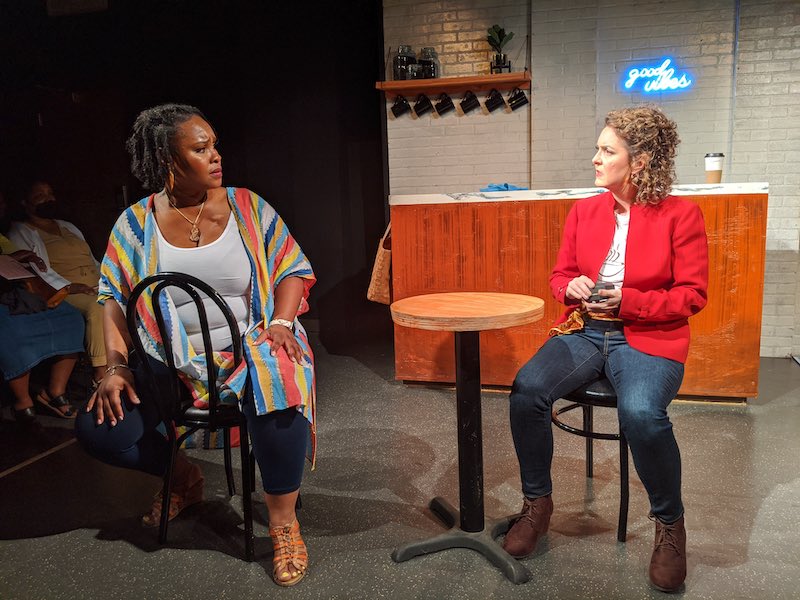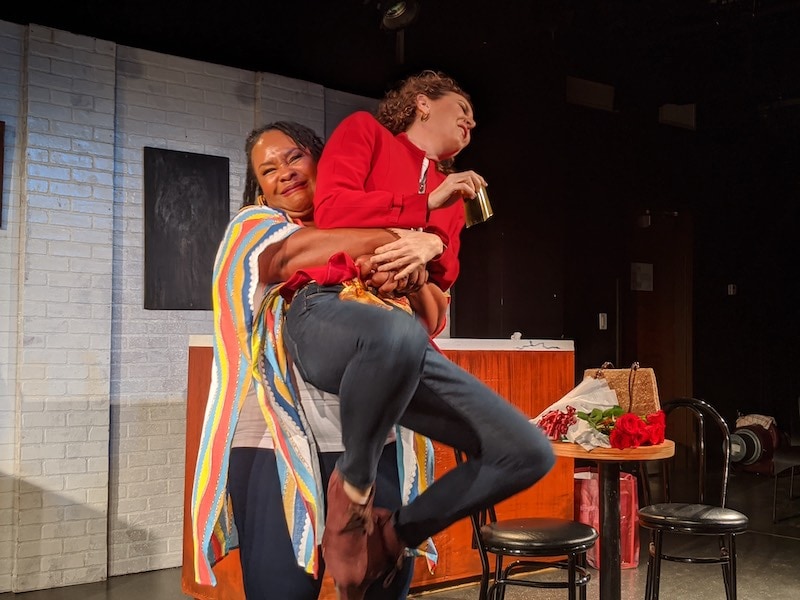Difficult conversations were not hard to come by in the summer of 2020. They seemed to be taking place everywhere, all the time — in living rooms, over Zoom, in DMs, on street corners, in cafes.
The aftermath of the murder of George Floyd created an urgency to talking about racism, and as a result, the thoughts that had been bubbling under the surface boiled over all at once. Many of these conversations were, unfortunately, marred by a sense of antagonism, making difficult discussions even more so.

Dissonance, a new play inspired by those conversations, imagines what a straightforward discussion about racism might look like if it is approached differently. Now performing through June 11 presented by The Essential Theatre, Dissonance sometimes stumbles but finds its footing when it stays grounded in the relationship at its center.
Written by Marci J. Duncan in collaboration with Kerry Sandell, Dissonance follows long-time friends Angela and Lauren — played by Duncan and Sandell, respectively — as they set up shop in a new cafe they are opening together in Pensacola’s Belmont-DeVilliers District, a historically Black neighborhood.
It’s clear from the start that Angela, who is Black, and Lauren, who is white, have a unique dynamic. They do a choreographed celebratory dance as they move into the space that will be their cafe. They talk about romance and give each other honest advice. They laugh at inside jokes and tease each other about old times.
They also, notably, seem adept at avoiding conflict. Every time the conversation starts to veer toward a topic or a disagreement that could get dicey, one of them steers it away. That includes the topic of racism, and Blackness in general. When the two do talk about race, they become noticeably more careful with their words, afraid to risk their relationship with each other by having a difficult conversation.
As directed by James Webb, Duncan and Sandell portray both sides of this friendship with a chemistry that feels natural. There are clear cultural differences between the two characters, sure, but you can also see the little ways that they have rubbed off on each other, the ways they work off each other, the ways that they unspokenly avoid crossing a point of no return. The specificity of their relationship, and the subtle tension that comes with it, drives the show forward for much of the first half.
It is in the second half of Dissonance, once the characters do cross a point of no return that the show loses its driving force. The tension elevates to conflict as the two have a difficult conversation for the first time in their relationship, in this case about racism and Blackness. The conversation broaches everything from interracial relationships to pay inequality to code-switching to white fragility.
Through it all, Angela is brutally honest. Lauren, meanwhile, is defensive. Somewhere in the mix, the specificity of their relationship is lost, not because of what they are talking about but because of the way they talk about it. For much of the show’s latter half, the way they speak to each other doesn’t feel grounded in the relationship they established in the first half. It doesn’t help that, too often, both actors resort to elevated volume in order to express elevated conflict. As a result, the conversation seems to move forward while the emotion beneath it stays still.
Luckily, Dissonance does eventually find its footing again. The dialogue and performances reach a point where the specificity of their dynamic returns, and the two characters unlock a refreshed emotional tone. Once that driving force returns, Dissonance is able to create an ending that is compelling and, dare I say, rewarding.

After all, both Angela and Lauren were afraid that a difficult conversation like this was too big a risk — for Angela, too big a risk that Lauren would become uncomfortable and defensive; for Lauren, too big a risk that she would say the wrong thing and Angela wouldn’t trust her anymore.
They do not avoid those risks in finally having a difficult conversation. Rather, Dissonance shows that if you approach difficult conversations like this one with love, respect, and an open mind, the risk is worth taking.
Running Time: 90 minutes with no intermission.
Dissonance plays through June 11, 2023, presented by The Essential Theatre performing at Anacostia Arts Center, 1231 Good Hope Road SE in Washington, DC. Tickets ($41) are available online.
The program for Dissonance is online here.
Recommended for age 12 and up.
COVID Safety: Masks are encouraged and welcomed.
SEE ALSO:
New play from Essential Theatre to mark third anniversary of George Floyd’s death (news story, April 15, 2023)




